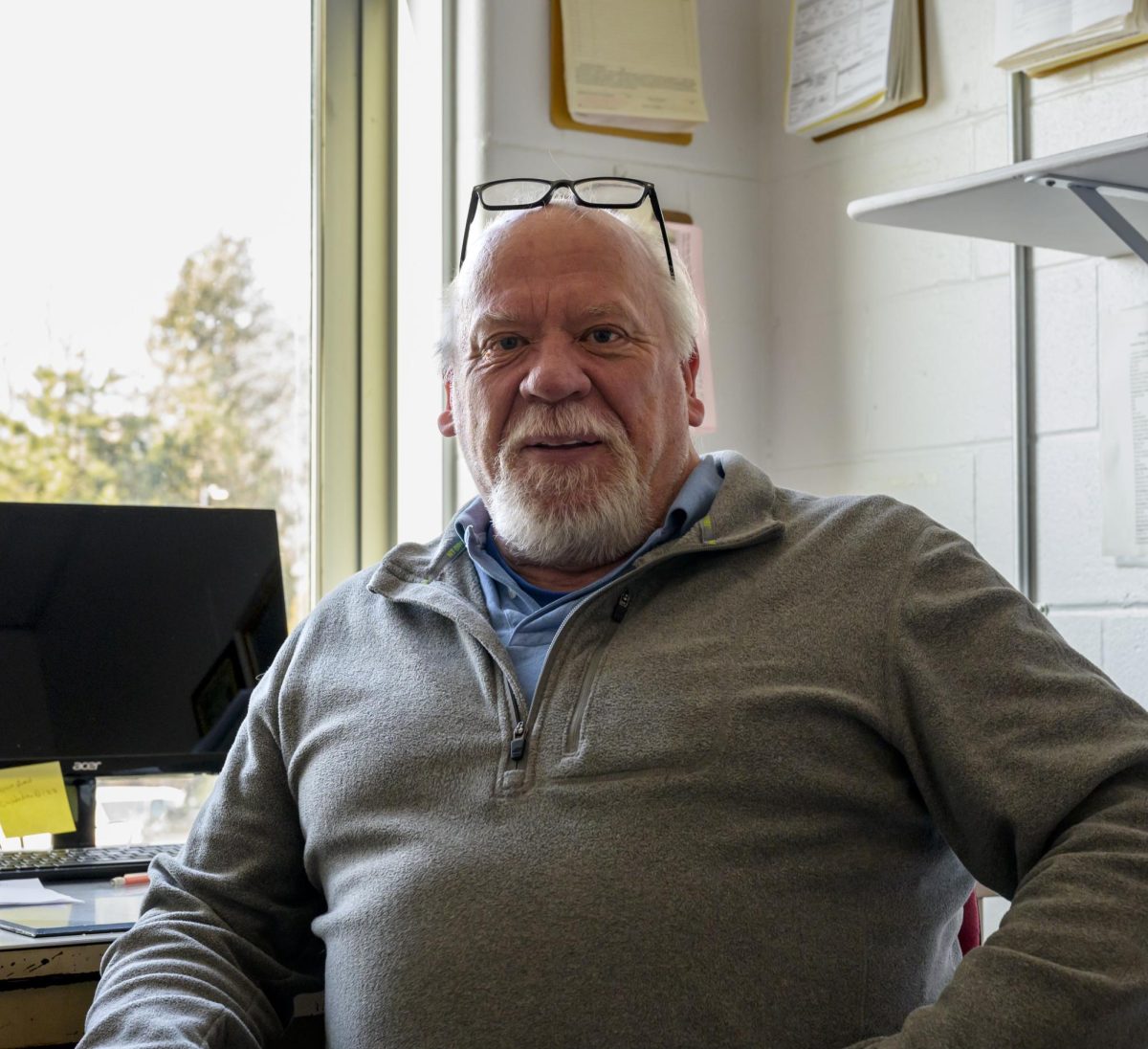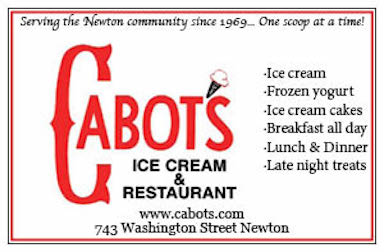by Danae Lally
When Spencer Bronk enters Newton North’s art studio, he is an instant celebrity. Students and staff drop what they are doing to greet him. Younger students, who have long admired his artwork, turn to him with eager glances, anxiously awaiting his feedback on their projects.
In this vibrant corner of the building, Spencer is a role model, a success story. Yet just down the hall, he may have a very different reputation because of the career path he has chosen to follow.
Spencer graduated from Newton North last spring, but unlike many of his peers, he is not attending college. He works at Brewer’s Coalition and eventually hopes to become a manager there. He has distant dreams of opening a bed and breakfast in Ireland.
Although his choices may appear foreign to some students at Newton North, Spencer has found a fulfilling lifestyle. He enjoys his job and remains deeply dedicated to his artwork.
The truth is, people define success in all different ways.
Amy Shen, a junior at Newton North, holds perhaps a more “traditional” definition of success, linking success to a sense of accomplishment.
“When I achieve something, like if I do well on a test or do well at a competition, it makes me happy,” said Amy, adding, “Sometimes [success] involves not being happy with your current situation since you always want to do better than what you have.”
Amy is an elite gymnast who trains vigorously several days a week and competes. She is also highly motivated to excel in school and plans on going to college to pursue a career in science or engineering.
Whereas Amy’s definition of success relates to goal-oriented achievement, Spencer’s is derived from a feeling of contentment. Neither of these two definitions of success is “right” or “wrong”. The meaning of success is often a highly personal matter that can help people discover facts about themselves and what they want out of life, which can lead to happiness.
In the book, Defining Success, Ray White writes, “We should define success so we can live it daily and recognize and appreciate it when we hit the milestones that mark our progress… Most importantly, if happiness includes feeling content, satisfied, and fulfilled, we need to define success so we can be content in our accomplishments so we can feel happier which will help us become more successful.” Success is often interconnected with this notion of happiness.
So if a person comes up with his or her own definition of success and strives to achieve this success, he or she will be happy. Is that really all there is to happiness?
One of the definitions of “success,” provided by dictionary.com, is “the attainment of wealth, position, honors, or the like.” Thus it is unsurprising that some people believe in the saying, “money can buy happiness.” However, Carlin Flora writes in Psychology Today, “Money does buy happiness, but only up to the point where it enables you to live comfortably. Beyond that, more cash doesn’t boost your well-being.”
Nikki Bustamante is a good example of how happiness does not necessarily depend on the cash in your wallets. Nikki is a college student who grew up in a large, poor family in California. I asked Nikki how success connects to happiness in her life, and she said, “I’m happy [with] how my life is going even though it’s hard… It feels good knowing that everything I have, I built. I have my own apartment, my own car, and no one handed it to me. I moved across the country when I was 17 with only $20, and then I got a job right away. So that makes me happy. It also reminds me of where I come from and growing up being poor, but we were happy. There were times when we would only eat literally rice and beans, but I was happy because my family was there.”
She may not be successful in terms of wealth, but she is successful in setting up a life for herself all on her own, and she is happy. She told me that she had to be independent because she was the oldest sibling in her family, so for Nikki the role of eldest child came with the responsibility of caring for her younger siblings and relatives. She says, “I think that I would define success, personally, by being self-made and independent and not relying on anybody to do things for me.”
Although Nikki is very independent, her family plays a huge role in her life, which is why she told me, “Happiness is like being around my family and doing things for others.” Nikki said, “Something that makes me happy is like buying my brother school supplies because I know he’ll never buy it himself, but he needs it.” Being there for her family makes Nikki happy, so it is unsurprising that many of her goals are centralized around helping her relatives. She says, “I want to help my family, I want my brother to go to school, and not have to worry about tuition like I do. And I want to buy my dad a house because he had a house, but then he got a divorce so he lost the house. And I want to help my mom.”
Family is a recurring theme I have seen a lot when discussing both happiness and success. I talked to many people within a wide range of ages and noticed that even teenagers came back to the idea of family.
Shannon Slattery, who is an art teacher at Newton North, says that part of achieving happiness for her is “feeling… safe. Having my family around me and knowing they’re all healthy and safe.” David Bennett, who teaches chemistry at North, echoed Ms. Slattery’s words about the importance of family. He told me, “I am probably happier than I’ve ever been in my life. Which is weird to say, but for me [success and happiness] is a family that I love and adore, a job that I really am passionate about and care a lot about.”
Even students want the happiness that comes with building a family.
Davida Tavan, a junior at Newton North, says, “The way I see myself being successful is going to school where I want, getting a decent job that’s near my family, getting married and having kids. It’s white-picket-fence, but it’s what I want.”
My very own sister, who owns a thriving business here in Boston, told me, “When I was your age I thought that I would only be happy if I went to an Ivy League school, I got married to a man, I had kids before I was thirty, and I got to travel all over the world, and I had a higher education degree, meaning at least a PhD, but definitely an MD. And the only one of those things that I’ve done is traveled all over the world. I’m not married, I’m certainly not married to a man. I don’t have any children, but also you came into my life… that empty hole inside of me where I felt like I really wanted to have a kid got filled by being able to watch you grow up and you be my little sister.” Although my sister, Chanel Luck, has yet to build her own family, she views her family as a big aspect of having a “successful life,” which brings her happiness.
Countless studies have attempted to identify the “keys” to happiness. In a study published on WebMD, researchers focused on the relationship between family ties, income, and happiness levels. Salynn Boyles writes that, “[W]hile income did contribute to happiness up to a point, the quality of family relationships was much more important… ‘Much of the research on money and happiness has shown a strong association up to the point where basic needs are met, and that is what we found,’ researcher Rebecca J. North tells WebMD. ‘But after this point income has a diminishing impact on happiness.’”
The Harvard Study of Adult Development also conducted a study where they tracked 724 men for 75 years. In a TED Talk, Robert Waldinger explained, “It turns out that people who are more socially connected to family, to friends, to community, are happier, they’re physically healthier, and they live longer than people who are less well connected… People who are more isolated than they want to be from others find that they are less happy, their health declines earlier in midlife, their brain functioning declines sooner and they live shorter lives than people who are not lonely.”
Before I started gathering the interviews and information on this topic, I viewed success as finding my purpose. I believed my purpose was to make a positive impact on people’s lives, and I was willing to dedicate my life to this mission. For me that meant sacrificing some of my “happiness” by focusing on studies to become a pediatric oncologist and not thinking about starting a family until way later in my life. Even when I was younger, I never imagined being successful or happy in life as having my own family, but as being a capable, hardworking, and independent woman. From interviewing many different people, all with different backgrounds, I realize that family plays an integral part in life for the past, present, and future. Needing my family does not make me less capable or less successful; that is what families are for: to support one another. Looking out for each other, supporting each other, and enjoying each other’s company is what family is about, which makes it seem obvious now how families can bring happiness and success.
In a study at the Sahlgrenska Academy and Lund University, in Sweden, psychologists looked at newspapers and found words linked to the term ‘happiness.’ Out of 1.5 million words, it was discovered that the words most associated with the word ‘happiness’ were ‘grandmother,’ ‘you,’ ‘me,’ ‘them,’ and similar words. However, words such as ‘iPhone,’ ‘millions,’ ‘Google,’ and more materialistic words were way less apparent, according to an article in the Daily Mail. This “suggests that our collective picture of what makes us happy is more about relationships,” while wealth for most people does not bring true happiness, according to the article.
Although success and happiness are difficult to define, people from these studies and people who I interviewed, reveal that success is not merely a measure of fame or material wealth Instead, it is closely connected to something we often take for granted: our family ties. Regardless of whether a person’s definition of success is based on personal achievement, close familial relationships are almost always necessary in finding happiness. Not all of us have a loving family member or biological blood relative we can confide in, but we should all have at least one person in our life who is our family, by blood or not.
Danae Lally is a junior at North. She originally wrote this piece for an AP Language and Composition assignment.
Breaking News
- February 1Foreign exchange program departures set to proceed on schedule amid teacher strike
- February 1Teacher strike reaches two full weeks as contract negotiations continue to progress
- January 31Newton parent files lawsuit against NTA amid prolonged strike
- January 31Committee anticipates new union proposal on thirteenth day of strike
- January 30Rejected contract proposals prolong negotiations amid ongoing teacher strike
- January 28School days in jeopardy as contract negotiations continue, NTA compromise package awaits approval
- January 25Teachers strike marks seventh day with progress in ongoing negotiations
- January 25Controversy surrounds NPS instagram posts criticizing teachers’ strike
- January 25Congresswoman Ayanna Pressley supports Newton Teachers Association in urgent call for education funding
- January 23Teachers continue strike amid fines and ongoing negotiations
TOP POSTS
- Wrestling Head coach John Staulo honored with induction into New England Hall of Fame after 27 years of coaching at North
- North's jazz ensemble strikes gold at MAJE regional festival
- Art Major IV students paint new generation of murals
- Winter varsity dance team shines at UDA nationals despite budget cuts
- New cafeteria lunch containers help make North more sustainable
- Boys hockey falls to Weymouth at annual senior night
- Chicago brings the roaring 20s to Lasker Auditorium
- Improv Jam provides the audience with a top-tier experience interacting with the show
- Sophomore speeches showcase variety of underrepresented topics
- Mean Girls Adaptation Lacks Spark of Original Movie
TRENDING STORIES
Follow Us on Twitter
PRINT SPECIALS
The simple truth behind happiness and success
April 17, 2016
Leave a Comment
Donate to The Newtonite
More to Discover

























































